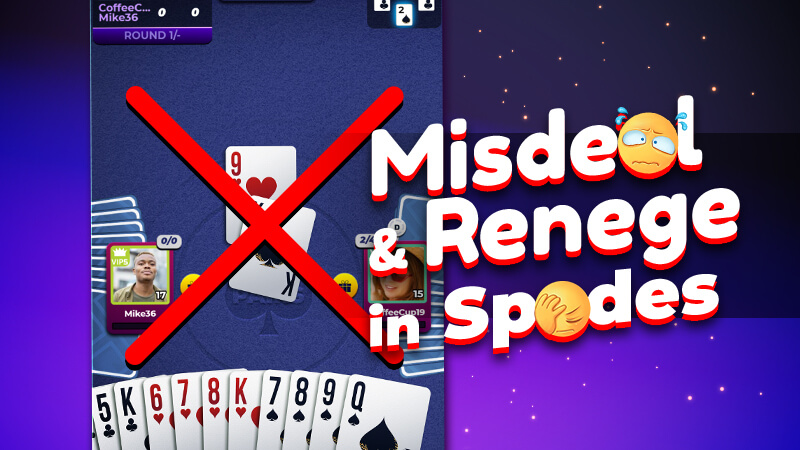In this blog post, we’ll shed light on the occurrence of misdeals in Spades, the factors that contribute to them, their profound impact on gameplay, and invaluable strategies to steer clear of these frustrating mishaps. After all, the rules of Spades exist to be followed.
1. What is a misdeal in Spades?
A misdeal in Spades refers to a faulty distribution of cards during the initial deal of the game. It occurs when the cards are not accurately distributed, resulting in an unequal or non-random allocation to the players. A fair and accurate deal is of utmost significance in any card game, including Spades, as it sets the foundation for an equitable and competitive gameplay experience.
Misdeals can stem from various factors, including human error, faulty shuffling techniques, or even intentional manipulation. Human error may involve the dealer miscounting the number of cards or accidentally exposing them during the shuffle or deal. These mistakes can lead to an imbalanced distribution, favoring certain players while disadvantaging others.
Inadequate shuffling may result in clumps or clusters of cards, preventing a truly random distribution. It can create patterns or sequences within the deck, which can be exploited by skilled players, undermining the fairness of the game.
In some unfortunate cases, misdeals may be intentional, driven by players seeking an unfair advantage. Such manipulation can involve discreetly marking or stacking the cards, enabling specific players to receive good hands consistently. This deceit compromises the integrity of the game, eroding trust and spoiling the enjoyment of all participants.
2. What is a renege in Spades?
In the game of Spades, a “renege” refers to a rule violation that occurs when a player fails to follow suit even though they have cards of that suit in their hand. It is also known as a “revoke” or “renege penalty.”
Here’s how it works:
During a trick, when it is a player’s turn to play a card, they are typically required to play a card from the same suit as the first card played in that trick, if they have any cards of that suit. However, if a player doesn’t have any cards of the leading suit, they are allowed to play a card from a different suit, known as “cross-ruffing” or “sluffing”.
If a player is caught reneging, meaning they have cards of the leading suit but fail to play one, it is considered a violation of the rules. The reneging player’s team will typically be penalized by deducting points from their score. The exact penalty usually involves subtracting a predetermined number of points from the team’s overall score.
3. How to Prevent Misdeals
Preventing misdeals in Spades is essential to maintain fairness and enhance the gaming experience. Consider the following strategies to minimize the occurrence of misdeals:
- Adequate shuffling. Proper card shuffling is crucial for creating a random distribution of cards. Encourage players to utilize effective shuffling techniques such as riffle shuffling, where the deck is split into two halves and interleaved together, or overhand shuffling, which involves sliding small packets of cards from one hand to the other.
- Dealer training. Dealers play a vital role in ensuring a fair deal. They need to be well-versed in the rules of Spades and skilled in proper card distribution. Encourage dealers to practice precision and attentiveness during the shuffle and deal process.
- Using quality cards. Investing in high-quality playing cards is crucial for preventing misdeals. Quality cards are less likely to stick together or show signs of wear and tear, ensuring a smoother shuffle and deal. Regularly inspect and replace worn-out cards to maintain a consistent playing experience. Additionally, ensure that playing surfaces are clean and free from sticky residue.
Now read, How to Bid in Spades.


